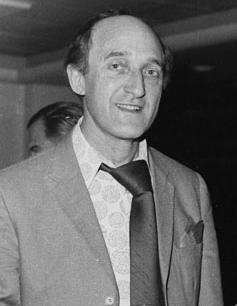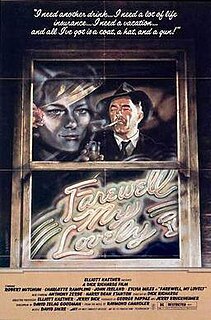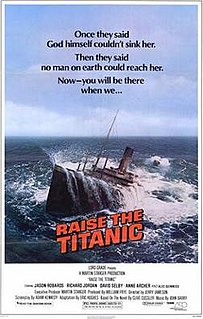
Lewis Frederick Ayres III was an American actor whose film and television career spanned 65 years. He is best known for starring as German soldier Paul Bäumer in the film All Quiet on the Western Front (1930) and for playing Dr. Kildare in nine movies. He was nominated for an Academy Award for Best Actor for his performance in Johnny Belinda (1948).

Lincoln Theodore Monroe Andrew Perry, better known by the stage name Stepin Fetchit, was an American vaudevillian, comedian, and film actor of Jamaican and Bahamian descent, considered to be the first black actor to have a successful film career. His highest profile was during the 1930s in films and on stage, when his persona of Stepin Fetchit was billed as the "Laziest Man in the World".

Ron Moody was an English actor, composer, singer and writer. He was best known for his portrayal of Fagin in Oliver! (1968) and its 1983 Broadway revival. Moody earned a Golden Globe Award and an Academy Award nomination for the film, as well as a Tony Award nomination for the stage production. Other notable projects include The Mouse on the Moon (1963), Mel Brooks' The Twelve Chairs (1970) and Flight of the Doves (1971), in which Moody shared the screen with Oliver! co-star Jack Wild.

The Persuaders! is an action-comedy series starring Tony Curtis and Roger Moore, produced by ITC Entertainment, and initially broadcast on ITV and ABC in 1971. The show has been called 'the last major entry in the cycle of adventure series that began 11 years earlier with Danger Man in 1960', as well as 'the most ambitious and most expensive of Sir Lew Grade's international action adventure series'. The Persuaders! was filmed in Britain, France, and Italy between May 1970 and June 1971.

The Protectors is a British television series, an action thriller created by Gerry Anderson. It was Anderson's second TV series to exclusively use live actors as opposed to marionettes, and his second to be firmly set in contemporary times. It was also the only Gerry Anderson–produced television series that was not of the fantasy or science fiction genres. It was produced by Lew Grade's ITC Entertainment production company. Despite not featuring marionettes or any real science fiction elements, The Protectors became one of Anderson's most popular productions, easily winning a renewal for a second series. A third series was in the planning stages when the show's major sponsor, Brut, ended its funding and thus forced the series' cancellation.

Lew Grade, Baron Grade, was a British media proprietor and impresario. Originally a dancer, and later a talent agent, Grade's interest in television production began in 1954 when, in partnership, he successfully bid for franchises in the newly created ITV network, which led to the creation of Associated Television (ATV). Having worked for a time in the United States, he was aware of the potential for the sale of television programming to American networks. The Incorporated Television Company was formed with this specific objective in mind. Grade had some success in this field with such series as Gerry Anderson's many Supermarionation series such as Thunderbirds, Patrick McGoohan's The Prisoner, and Jim Henson's The Muppet Show. Later, Grade invested in feature film production, but several expensive box-office failures caused him to lose control of ITC, and ultimately resulted in the disestablishment of ATV after it lost its ITV franchise.

The Legend of the Lone Ranger is a 1981 American Western film that was directed by William A. Fraker and stars Klinton Spilsbury, Michael Horse and Christopher Lloyd.

Glyn Griffith Owen was a British stage, television and film actor, best known to British TV viewers for three roles: that of Dr Patrick O'Meara in Emergency Ward 10, Edward Hammond in The Brothers, and Jack Rolfe in Howards' Way.

The Long Good Friday is a 1980 British gangster film starring Bob Hoskins and Helen Mirren. It was completed in 1979, but because of release delays, it is generally credited as an ‘80s film. The storyline weaves together events and concerns of the late 1970s, including mid-level political and police corruption, and IRA fund-raising.

Hollywood Shuffle is a 1987 American satirical comedy film about the racial stereotypes of African Americans in film and television. The film tracks the attempts of Bobby Taylor to become a successful actor and the mental and external roadblocks he encounters, represented through a series of interspersed vignettes and fantasies. Produced, directed, and co-written by Robert Townsend, the film is semi-autobiographical, reflecting Townsend's experiences as a black actor when he was told he was not "black enough" for certain roles.
Lew Landers was an American independent film and television director.
John Hough is a British film and television director. He is primarily known for his suspense films of the 1970s and 1980s, including Twins of Evil (1971), The Legend of Hell House (1973), Dirty Mary, Crazy Larry, The Incubus (1982) and American Gothic (1988).

The Tamarind Seed is a 1974 American-British drama romance thriller film written and directed by Blake Edwards and starring Julie Andrews and Omar Sharif. Based on the 1971 novel The Tamarind Seed by Evelyn Anthony, the film is about a British Home Office functionary and a Soviet era attaché who are lovers involved in Cold War intrigue. The Tamarind Seed was the first film produced by Lorimar Productions. The film score was composed by John Barry.

Movie Movie is a 1978 American double bill directed by Stanley Donen. It consists of two films: Dynamite Hands, a boxing ring morality play, and Baxter's Beauties of 1933, a musical comedy, both starring the husband-and-wife team of George C. Scott and Trish Van Devere. A fake trailer for a flying-ace movie set in World War I titled Zero Hour is shown between the double feature.

Farewell, My Lovely is a 1975 American neo-noir crime thriller film directed by Dick Richards and featuring Robert Mitchum as private detective Philip Marlowe. The picture is based on Raymond Chandler's novel Farewell, My Lovely (1940), which had previously been adapted for film as Murder, My Sweet in 1944. The supporting cast features Charlotte Rampling, John Ireland, Jack O'Halloran, Sylvia Miles and Harry Dean Stanton, with a colorful early screen appearance by Sylvester Stallone, and hardcore crime novelist Jim Thompson in his only acting role as Charlotte Rampling's character's elderly husband Judge Grayle. Mitchum returned to the role of Marlowe three years later in the 1978 film The Big Sleep, making him the only actor to portray Philip Marlowe more than once in a feature film.

Dr. Bunsen Honeydew is a Muppet character from The Muppet Show, performed by Dave Goelz. He is a bald, yellow-skinned, bespectacled, lab-coated scientist who presented periodic science segments from "Muppet Labs, where the future is being made today." The character has no eyes, only completely transparent, lensless glasses, giving the appearance of a stereotypical absent-minded intellectual. His first name is derived from Robert Bunsen, after whom the Bunsen Burner was named. His last name is a reference to the honeydew melon, which his head is virtually shaped like. It is also a reference to Honeywell Labs, a technology company which aired TV commercials well-known at the time of the original Muppet Show.

Desperate Characters is a 1971 American drama film produced, written, and directed by Frank D. Gilroy, who based his screenplay on the 1970 novel of the same name by Paula Fox.

Raise the Titanic is a 1980 adventure film produced by Lew Grade's ITC Entertainment and directed by Jerry Jameson. The film, written by Eric Hughes (adaptation) and Adam Kennedy (screenplay), is based on the 1976 book of the same name by Clive Cussler. The storyline concerns a plan to recover the RMS Titanic due to the fact that it was carrying cargo valuable to Cold War hegemony.

Jeffrey Allen Bloom is an American film director, film producer, screenwriter and photographer, currently residing in Studio City, California. His film projects include Flowers in the Attic, Nightmares, Blood Beach and Dogpound Shuffle.
"The Square Triangle" is the tenth episode aired of the first series of UFO - a 1970 British television science fiction series about an alien invasion of Earth. The screenplay was written by Alan Pattillo and the director was David Lane. The episode was filmed between 3 September and 15 September 1969 and aired on the ATV Midlands on 9 December 1970. Though shown as the ninth episode, it was actually the eleventh to have been filmed.

















